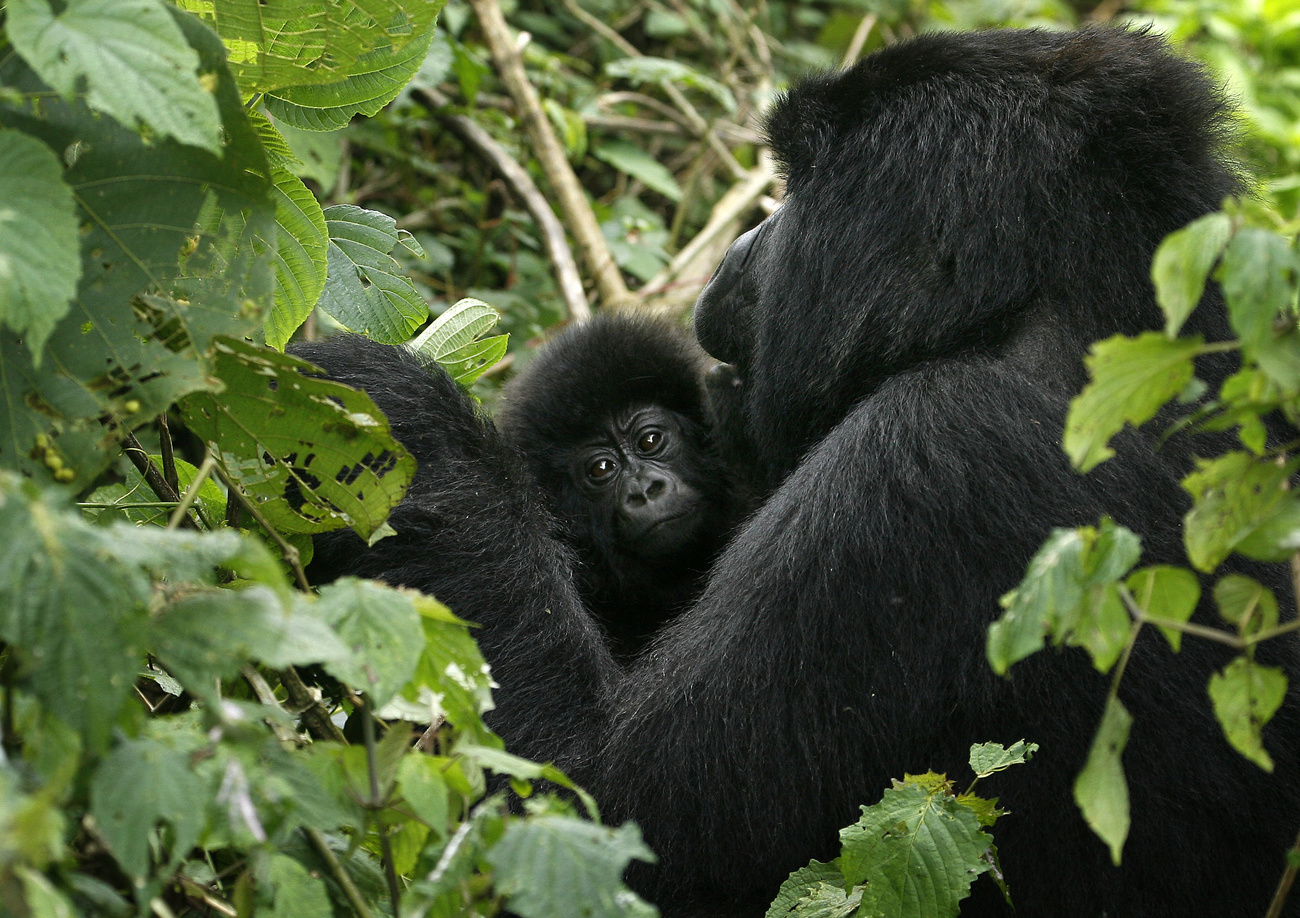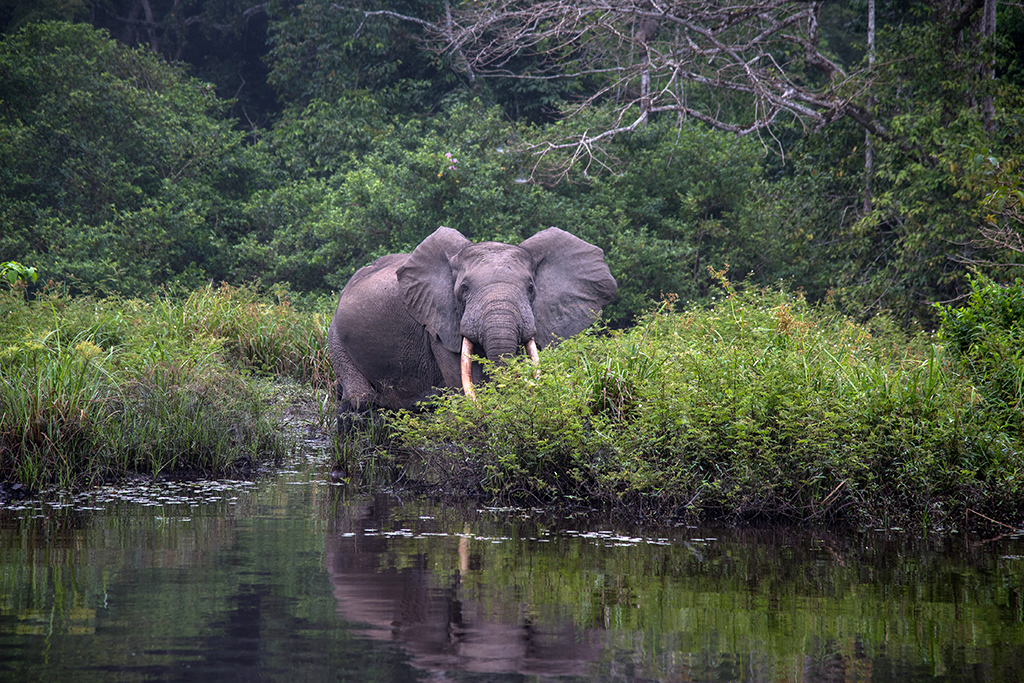
Can war crimes be committed against animals?

More than 200 global species, including iconic gorillas, elephants and antelope, have become endangered by wars, conflicts and military exercises. That’s according to a recent report by the International Union for the Conservation of Nature, based near Geneva. The IUCN urges sanctions against those who commit “war crimes against the environment” and suggests some possible mechanisms. We look at the report’s findings and the legal obstacles to such prosecutions.
“There’s no question that war has an overwhelmingly negative impact on wildlife and increasing species extinction risk,” says IUCN chief scientist Thomas Brooks. The organisation’s “Red List” of threatened species includes 219 with a high risk of extinction mainly as a result of war and conflict.
The reportExternal link, entitled “Conflict and Conservation”, looks at the linkages between these two issues. It uses historical data to analyse the impact of conflicts on animals and the environment. It also outlines how efforts to increase biodiversity and natural resources can reduce the risk of conflict.
“Conflict is a real problem for conservation,” says Bill Adams, a visiting professor in conflict and development at the Geneva-based Graduate Institute. “But I thought, reading the report, that there are actually quite a few opportunities for conservation in post-conflict situations. In some cases, conservation has been an important part of a sort of peace dividend.” He cites the example of cross-border “peace parks” created in southern Africa, notably between South Africa, Mozambique and Zimbabwe after the civil war.
Creatures great and small
Animals threatened by human conflict include a variety of species, according to the IUCN. “A poster child example would be the Eastern Gorilla in central Africa, where war in eastern Democratic Republic of Congo and in Rwanda has certainly driven increased extinction risk both through direct killing of animals and also tragically through the undermining of local conservation efforts and persecution of conservation staff,” Brooks continues. Other examples include a critically endangered species of antelope threatened by conflict and direct killing in the Sahel and elephants killed by armed groups in the Central African Republic. Looking further back in time, Brooks says there’s also little doubt that war drove the complete extinction of the Java rhinoceros in Vietnam. This species now exists only on the island of Java and in Indonesia.

But as well as large mammals, Brooks says there are also many smaller or less well-known species threatened by wars, including a fish which may already be extinct due to “knock-on impacts on hydrology in the recent Syrian conflict, driven by uncontrolled well-drilling for access to water”.
As armed groups besieging Syrian towns cut off water supplies and shelling caused damage to water infrastructure, citizens as well as others have been digging their own wells. This now poses a threat to underground water resources. Members of armed groups could be prosecuted for wanton destruction of water supplies causing damage to humans, on which current war crimes definitions focus.
Animals threatened due to human conflict are often killed directly for food or suffer from the degradation of their natural environment. Illegal wildlife trafficking may be used to finance conflict activities, and there is also incidental mortality caused, for example, by landmines. In addition, as in the gorilla example, conflict often has a negative impact on conservation areas, including conservation staff being killed, according to Brooks. “We think of that terrible human toll, but it also takes a toll on wild animals,” he says.
“Environmental war crimes”
The IUCN report recommends “sanctions against those who commit environmental war crimes”. “Such crimes could include tactical destruction of forests or other ecosystems, poaching of wildlife or timber to finance conflict, or inadvertent impacts of pollution from chemicals, oil or noise,” it says.
But this is a thorny legal issue. While the push for prosecution of environmental crimes has grown in recent years, including frustrated efforts to get “ecocide” included in the Statute of the International Criminal Court (ICC), it raises many questions: how to define crimes, who to sanction and in which jurisdictions.
“Does it stem from animal rights? Is it something to do with sentiments about the species, that it’s a greater crime to make a gorilla extinct than a beetle?” asks Adams. “Would it count as a war crime against the environment if you tested a nuclear weapon?”
“Mechanisms to establish sanctions could include enhancing the United Nations Compensation Commission’s powers and ensuring prosecution of environmental war crimes through the International Criminal Court, strengthened by the ongoing deliberations on the subject by the United Nations International Law Commission,” says the IUCN. Other proposals, it adds, are including the crime of ecocide at the ICC and a fifth Geneva Convention to protect nature during conflict.
The ICC’s current definition of war crimesExternal link makes frequent reference to the Geneva Conventions. As well as the wilful murder, rape and torture of civilians, it also includes pillage, using child soldiers, destruction of buildings and property, cultural objects and installations and cutting off water supplies, if “not justified by military necessity and carried out unlawfully and wantonly”.
The UN’s Geneva-based Compensation CommissionExternal link was set up in 1991 to “process claims and pay compensation for losses and damage suffered as a direct result of Iraq’s unlawful invasion and occupation of Kuwait in 1990-1991”. These claims included 170 for damage to the environmentExternal link, including depletion of natural resources in the Gulf region as a result of oil-well fires and the discharge of oil into the sea.
The International Law CommissionExternal link, also Geneva-based, was set up in 1947 to make recommendations on the development of international law. It included protection of the environment in relation to armed conflictsExternal link in its work in 2013.
ICC inaction and Congolese cases
As for the ICC, outgoing Prosecutor Fatou Bensouda said in her 2016 Policy Paper on Case Selection and PrioritisationExternal link that her Office “will give particular consideration to prosecuting Rome Statute crimes that are committed by means of, or that result in, inter alia, the destruction of the environment, the illegal exploitation of natural resources or the illegal dispossession of land”. But there has still not been a single case at the ICC that included environmental crimes.
The ICC has jurisdiction over crimes of genocide, war crimes and crimes against humanity. Its current definition of these crimes does not include specific mention of environmental crimes.
“It’s difficult enough even to get something like genocide taken to the International Criminal Court,” says Adams. “So to add the complications of poaching wildlife or poaching of timber, that seems to me interesting legally and maybe important, but I wouldn’t have thought it was practical at the present time.”
Perhaps it is more likely that national jurisdictions could show the way. In the DRC, a few cases have already been broughtExternal link before military tribunals mostly against members of the armed forces. They include one involving a senior Congolese army officer, Colonel Liwenge Eboko, and some of his men who were sentenced on January 29, 2020 to 16 months in prison for “environmental crime”. Liwenge was sentenced for failing to prevent and punish his men for poaching in the Virunga wildlife park in eastern DRC.
Asked if he thinks legal actions against environmental war crimes are likely, Brooks of the IUCN remains hopeful. “We should be exploring all the options we can,” he says. “International legal resources take a long time and are very difficult to implement. But they do provide an extremely strong basis if and when they get established. So I certainly wouldn’t recommend giving up on the possibility of recourses in international law. But equally, I wouldn’t put all of my eggs in one basket.”

In compliance with the JTI standards
More: SWI swissinfo.ch certified by the Journalism Trust Initiative




























Join the conversation!